- Home
- Tad Williams
Brothers of the Wind
Brothers of the Wind Read online
DAW Books Presents The Finest in Imaginative Fiction by
TAD WILLIAMS
MEMORY, SORROW AND THORN
THE DRAGONBONE CHAIR
STONE OF FAREWELL
TO GREEN ANGEL TOWER
THE LAST KING OF OSTEN ARD
THE WITCHWOOD CROWN
EMPIRE OF GRASS
INTO THE NARROWDARK*
THE NAVIGATOR’S CHILDREN*
THE HEART OF WHAT WAS LOST
BROTHERS OF THE WIND
* * *
THE BOBBY DOLLAR NOVELS
THE DIRTY STREETS OF HEAVEN
HAPPY HOUR IN HELL
SLEEPING LATE ON JUDGEMENT DAY
SHADOWMARCH
SHADOWMARCH
SHADOWPLAY
SHADOWRISE
SHADOWHEART
OTHERLAND
CITY OF GOLDEN SHADOW
RIVER OF BLUE FIRE
MOUNTAIN OF BLACK GLASS
SEA OF SILVER LIGHT
TAILCHASER’S SONG
THE WAR OF THE FLOWERS
*Coming soon from DAW
Copyright © 2021 Beale Williams Enterprise.
All Rights Reserved.
Cover illustration by Jim Tierney.
Map by Isaac Stewart.
Interior ornament courtesy Adobe Stock.
DAW Book Collectors No. 1897.
Published by DAW Books, Inc.
1745 Broadway, New York, NY 10019.
All characters and events in this book are fictitious.
Any resemblance to persons living or dead is strictly coincidental.
The scanning, uploading, and distribution of this book via the Internet or any other means without the permission of the publisher is illegal, and punishable by law. Please purchase only authorized electronic editions, and do not participate in or encourage the electronic piracy of copyrighted materials. Your support of the author’s rights is appreciated.
Ebook ISBN 9780756412708
DAW TRADEMARK REGISTERED
U.S. PAT. AND TM. OFF. AND FOREIGN COUNTRIES
—MARCA REGISTRADA
HECHO EN U.S.A.
PRINTED IN THE U.S.A.
pid_prh_5.8.0_c0_r0
Dedication
This book is dedicated to our dear friend Cindy Yan, who left us in 2020 after a years-long struggle with cancer. Some in our community knew her as “Blue” or “Cyan”, but to everyone who knew her, she was a wonderful friend. Her energy and wicked sense of humor, as well as her determination to wring as much out of life as possible, ensured that even though she lost that life far, far too soon, she did not waste a moment of the time she had.
What it comes down to is this: Cindy made herself an important part of our world, and also a big part of the world of many, many others around her. The joy of that, our good fortune, became even more clear when she left us. Farewell, brave and beloved. We will never stop missing you.
I also want to share this dedication with Cindy’s friend and roommate, Mark Gambal, who took such good and selfless care of her during her last months. On behalf of Cindy and all the friends who loved her like you did, thank you, Mark.
Contents
Cover
Also by Tad Williams
Title Page
Copyright
Dedication
Acknowledgments
Map
Part One
The Black Worm
Part Two
The Silver Tree
Part Three
The White Walls
Part Four
The Gray Lands
Part Five
The Green Sea
About the Author
Acknowledgments
All of the Osten Ard books I’ve written since I came back to the place after many, many years of absence have benefited more than I can tell from the work of a wonderful group of people who have propped me up through the process (occasionally after correctly knocking me down) of returning to this world I might have originally invented, but which they actually knew better than I did.
(Authors, this one anyway, do not tend to brood over their previous inventions. It is always “On to the next story!”)
So to the extent the new Osten Ard books follow seamlessly from the originals, they deserve most of the credit. I will take the rap for any egregious diversions—although sometimes a writer just has to invent new stuff.
In any case, the list could be almost endless, but I will acknowledge those most guilty of the sin of Tad-enabling:
The Official Canoneers: Ylva von Löhneysen, Ron Hyde, Angela Welchel, Jeremy Erman.
My Book-Constructin’ Support Team: Deborah Beale (wife, editor, and Official Beloved), and publishers/publisher-affiliated All-Stars Betsy Wollheim, Sheila Gilbert, Josh Starr, and Marylou Capes-Platt.
Other Important Enablers of Tad: Lisa Tveit (tadwilliams.com administrator) and the kind, helpful, patient people on the TW Message Board and my social media accounts, who are definitely not baying for my blood at the long waits for new volumes. (They’ve actually been super-patient and sweet.)
A thousand thanks are not enough. A million thanks, while closer to what is deserved, might mean you’d never get to reading the story, so I’ll leave it at a thousand.
Blessings on all of you.
Part One
The Black Worm
I now undertake to tell my master Hakatri’s story, or at least the parts of it that I myself witnessed, but even before I have begun I am already full of doubts. I cannot tell my master’s tale without telling some of my own, but I am not the same person who journeyed so long at his side. The things that happened to us changed me almost as much as they did him, and I can scarcely remember now the person I was then. Still, this Pamon Kes will do his best to tell of what that Pamon Kes saw, heard, and felt during that fateful time.
I have no idea who will read these words, but I feel I must set them down. The years are passing; death will eventually close my eyes and still my tongue. The knowledge of such important events does not belong to me alone, but to all the heirs of the Lost Garden.
Still, it is a painful thing to tell unhappy truths, even from behind the shield of honesty. Many will scorn my words because of what I am—Tinukeda’ya, though we are often called “changelings” and thought by many to be a lesser kind of creature than our Zida’ya masters. But I beg those who might be angered by my tale to understand that despite all that happened, I still feel loyalty to the House of Year-Dancing and the people of Asu’a. The only way left for me to demonstrate that loyalty, and to celebrate my master, is to set things out just as I remember them, without care for the unhappiness that some might feel at seeing them revealed.
“Duty is honor,” my stern father often used to tell me. “And honor is all.”
But I would amend his saying. I have learned that our first duty is to truth, because without truth, honor itself is hollow.
It was in the last days of the Serpent Moon, early in the Season of Renewal, just as the weather began to turn. Everything seemed ordinary for that time of year: the sky was cold but bright above the city, as it had been for several days, and many birds sang.
After I had arisen and offered a prayer to the Lost Garden, I went to the great palace stables to oversee the care of my master’s horses and watch the morning feeding to see who was fit and who was nursing some woe or wound. It seemed like any other day. All around me Tinukeda’ya of lesser rank and status than min
e, mostly grooms and stable hands, hard at work even after the horses had finished eating; busy currying the beasts’ fine coats, walking them out to exercise on the white sand of the great courtyard, and ministering to them in a hundred other small ways. The stables of Asu’a are filled with old, proud bloodlines, and those who tend them are proud, too.
Yohe, armiger to my master’s brother Ineluki—what the mortals of the south would call a “squire”—was the only Zida’ya in the stables when I arrived. Yohe was lean even for her slender race, strong-fingered and practical, wearing her hair always close-braided so it would not interfere with her work. She was singing quietly as she introduced a nine-season foal to the moth bridle. Our eyes met, but she gave me only a curt nod of greeting. I was an armiger, just as Yohe was, but none of the Zida’ya squires ever wasted much time being courteous to me, though Yohe would at least acknowledge my presence. She also had an excuse for her less than friendly greeting: the first time introducing a young horse to the bridle is a delicate moment. Our mounts do not like having anything on their faces, even a restraint as light as a moth bridle. (I have never understood how mortals can put a bit in their horses’ mouths. Our Asu’a steeds would never put up with it.) I watched for a moment as Yohe raised and lifted the “wings” of the moth with each gentle pull on the reins. The foal shuffled a little, but Yohe had a light touch and the foal remained calm, lulled by her ancient song. I returned to inspecting my master’s horses.
As I was removing a stone from pale Seafoam’s hoof and wondering whether to have the bronzesmith make her a new shoe, a young Tinukeda’ya stable hand came running in from the courtyard. It was Nali-Yun, his face flushed with excitement.
“Master Pamon, there are mortal men in the palace!” he announced loudly.
Yohe turned on him. “Are you witless?” she hissed at him, trying to soothe the startled foal. “Roaring like some animal! Have a care, changeling!”
I pulled Nali-Yun aside. “When are there not mortal men in the palace?” I asked him quietly. “They line up at the gates before dawn every day with things to trade or sell. They lurk around the Visitor’s Court creaking like crows at everyone who passes by, hoping for an audience with the Sa’onsera and the Protector—an audience they will never get. We can scarcely take a step out of the inner palace without stumbling over some mortal or other. Why do you shout about such ordinary things?”
“You are as stiff as a stick, Pamon Kes,” he complained. “My news is nothing ordinary.”
“Neither is shouting in the stables.” But I disliked chiding another Tinukeda’ya in front of Yohe—she and the other Zida’ya squires already thought little of our kind. “So tell me, why is the arrival of more mortals anything unusual?”
“Because it is a whole company of mortal men from the west. They have come seeking an audience—and Lady Amerasu has granted it to them. It will begin when the morning bell rings. You must go swiftly!”
“Do not make me ask for quiet again,” Yohe warned him sternly.
I did my best to keep my temper with the young groom. “Why should I rush? To see a few mortal men? That is nothing new.”
“Well, you still might want to hurry,” he said with a grin. “Because your master Lord Hakatri wants you to come to him in Thousand Leaves Hall.”
“You fool.” I was truly irritated now. “You should have told me that first.”
I immediately cleaned myself as best I could and hurried to the great hall, but the groom’s nonsense had delayed me. By the time I reached the antechamber of the great hall the other folk of the court had already begun filing in. The largest number of them were golden-skinned Zida’ya like my master, but I could see a few bone-pale Hikeda’ya—the Zida’ya’s sister clan—among them. (We Tinukeda’ya also have golden skin, but it has a less robust hue than that of our Zida’ya masters, like wine that has been watered.) The Hikeda’ya were now scarce in Asu’a—most of them had followed their self-styled queen Utuk’ku north to her mountain city of Nakkiga—which only made those remaining, with their eyes like black onyx and their skins pale as scraped parchment, stand out from the rest of the crowd. The Hikeda’ya who stayed had chosen their lives in Asu’a among the Zida’ya over blood ties, and though their northern relatives might despise that choice or even think them traitors, the Hikeda’ya of Asu’a still mingled freely with my master’s folk, as if the great separation of the two clans had never happened.
As I entered, the day’s first light shone from the high windows of Thousand Leaves Hall, splashing down on the myriad hues worn by the Zida’ya, both in their clothing and in the fanciful shades of their hair. Far above our heads, the light also struck brilliant gleams from the wings of the countless butterflies clinging to the sides and slender roof-beams of the sacred dome known as the Yásira as they slowly stirred into morning life.
On the daïs beneath the open-air dome sat the leading members of the House of Year-Dancing —most of them, that is. Pride of place of course belonged to Sa’onsera Amerasu and Protector Iyu’unigato, my master Hakatri’s parents. My master’s wife Briseyu was there too, holding their little daughter Likimeya, who did not seem to want to be held. Even my master’s younger brother, Ineluki, had arrived and joined his family. The only member of the Year-Dancing root and bough not on the daïs was my master himself.
As I craned my neck to look around the great hall—Hakatri was usually the soul of promptness—I finally noticed the half-dozen figures kneeling at the foot of the daïs, gazing up at the masters of the Year-Dancing Clan like prisoners of war hoping for mercy. These mortals were tangle-haired and bearded, as was common among the males of that folk, dressed in rough garb made from wool and animal hides. In truth, between their unkempt hair and thick furs, I thought they looked little more than animals themselves.
The one I guessed to be their leader looked young, but he was as shaggy and unshaven as the rest, and his eyes seemed small and secretive compared to those of my master’s folk—or to those of my own people, for that matter. His hair and whiskers were a fiery shade of red I had seldom seen on a mortal before, so bright it might have been dyed. I also thought I saw something open and inquisitive about his face—an unmistakable intelligence that belied his savage appearance.
Amerasu Ship-Born was also observing the newcomers, her expression calm and benign, like someone at prayer. The Sa’onsera wore her usual modest robes, gray as rain clouds or the velvety breast of a dove, but they did not make her invisible—far from it. Even her husband, great Iyu’unigato, chief protector of all the Zida’ya clans, seemed to recede into the shadows beside her. Amerasu’s wise, gentle face drew the eye like a candle flame in a dark room.
Then she raised her hand and those gathered in the hall fell silent. “We give you welcome, men of the west.” Her voice did not seem much more than conversational but it carried across the great hall. “You are guests in our house and need fear no harm.” She then turned to the mortals’ young leader. “Tell us your name and your errand.”
The chief of the delegation bowed his head. “Thank you, Majesty. We are grateful that you and your husband have agreed to hear us. It is a great honor to come before the king and queen of the Zida’ya.”
Amerasu’s smile was gentle, but those who knew her might have recognized a flicker of discomfort. “Those are mortal titles, young man, not ours. My husband is the Protector of Year-Dancing House, and I am the caretaker of its rituals. Our rulings have only as much power as the respect they earn.”
The mortal bowed again. “Forgive our ignorance, my lady. It has been long since any of my folk were here in great Asu’a, and we are unfamiliar with your customs. Only our terrible need brings us to trouble you today.”
“You still have not told us your name or your home,” she prompted him.
“What do they want?” asked her husband, who often seemed to be thinking of other matters, even with all of Asu’a gathered before him. “Do we kno
w yet?”
“Forgive me, Lord and Lady.” The mortal blushed, a strange sight to my eyes, as if someone had built a fire inside him that glowed through the skin of his cheeks and his long neck. “I am Prince Cormach, grandson of King Gorlach, of the line of Hern the Great. Our kingdom is in the place you call M’yin Azoshai at the edge of the western mountains—as you know well, my lords and ladies, since that country was given to Hern’s folk as their freehold by your own people.”
I knew this ancient story only vaguely, but Amerasu nodded in agreement. “Yes, the gift of those lands to Hern the Hunter was confirmed by my mother and father,” she said. “But that does not tell us what brings you to our court today.”
“Do not hesitate to tell us your business, mortal men,” said Ineluki, smiling broadly. “Perhaps you have found the weather unpleasant on Azosha’s hill and wish to give that country back to the Zida’ya.”
My master’s brother was fond of jests, although he could also be quick to take offense when he was the target of someone else’s wit. “Or have your sheep wandered away from you and into our lands?”
The mortal named Cormach appeared uncertain whether he was being mocked and turned hurriedly back to Amerasu. “Neither of those things is true! We rode here to kneel at your feet, Lord and Lady of Asu’a, because our present situation is dire. We came for no other purpose.”
“Do not be troubled,” Amerasu said. “My younger son is pleased to make a sort of jest.” She gave Ineluki a look that, though it contained affection, also showed she did not approve of teasing guests, mortal or otherwise. “Tell us truly what brings you to us, Prince Cormach. I promise you that you will be heard with courtesy from here on.”
Like the others watching this unusual audience, all my attention was fixed on the gathering at the daïs; when someone clutched my elbow, it was all I could do not to cry out in surprise.

 God Rest Ye Merry, Gentlepig
God Rest Ye Merry, Gentlepig Tailchaser's Song
Tailchaser's Song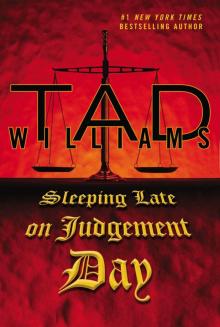 Sleeping Late on Judgement Day
Sleeping Late on Judgement Day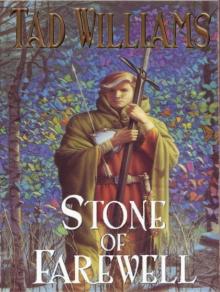 Stone of Farewell
Stone of Farewell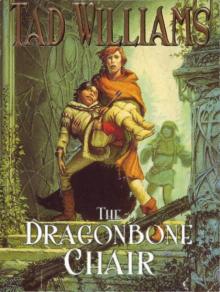 The Dragonbone Chair
The Dragonbone Chair Sea of Silver Light
Sea of Silver Light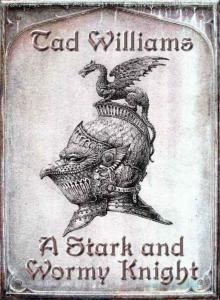 A Stark and Wormy Knight
A Stark and Wormy Knight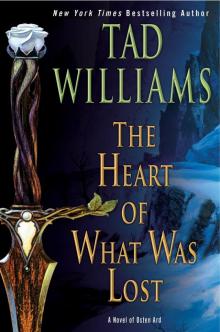 The Heart of What Was Lost
The Heart of What Was Lost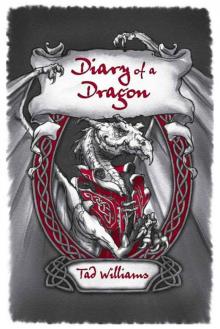 Diary of a Dragon
Diary of a Dragon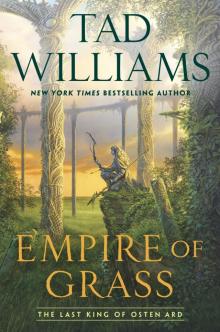 Last King of Osten Ard 02 - Empire of Grass
Last King of Osten Ard 02 - Empire of Grass To Green Angel Tower, Volume 1
To Green Angel Tower, Volume 1 The Dirty Streets of Heaven
The Dirty Streets of Heaven River of Blue Fire
River of Blue Fire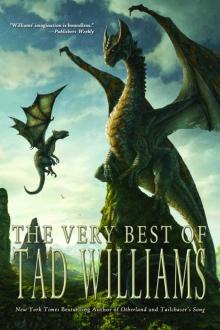 The Very Best of Tad Williams
The Very Best of Tad Williams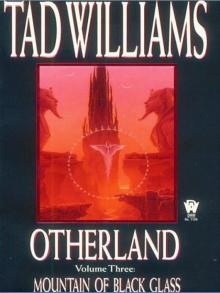 Mountain of Black Glass
Mountain of Black Glass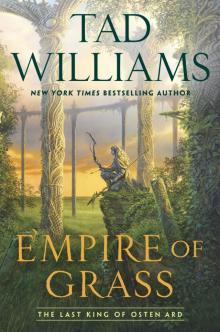 Empire of Grass
Empire of Grass City of Golden Shadow
City of Golden Shadow Happy Hour in Hell
Happy Hour in Hell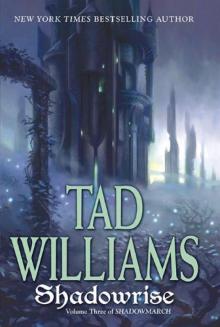 Shadowrise
Shadowrise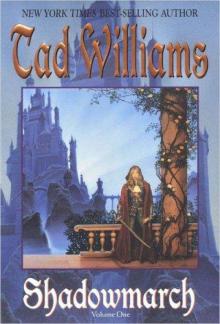 Shadowmarch
Shadowmarch Brothers of the Wind
Brothers of the Wind Shadowheart
Shadowheart Bobby Dollar 02 - Happy Hour In Hell
Bobby Dollar 02 - Happy Hour In Hell The War of the Flowers
The War of the Flowers The Dirty Streets of Heaven bd-1
The Dirty Streets of Heaven bd-1 Tad Williams - The War of the Flowers (retail) (pdf)
Tad Williams - The War of the Flowers (retail) (pdf) Shadowheart s-4
Shadowheart s-4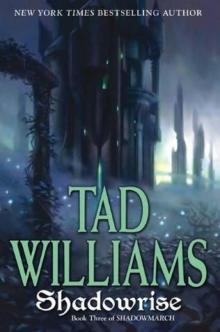 Shadowrise s-3
Shadowrise s-3 The Dirty Streets of Heaven: Volume One of Bobby Dollar
The Dirty Streets of Heaven: Volume One of Bobby Dollar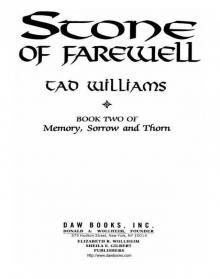 The Stone of Farewell
The Stone of Farewell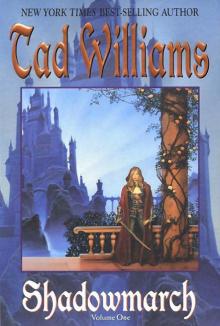 (Shadowmarch #1) Shadowmarch
(Shadowmarch #1) Shadowmarch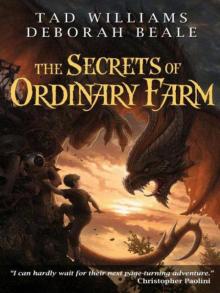 The Secrets of Ordinary Farm of-2
The Secrets of Ordinary Farm of-2 Shadowmarch s-1
Shadowmarch s-1![Bobby Dollar [04] God Rest Ye Merry, Gentlepig Read online](http://i1.bookreadfree.com/i1/04/06/bobby_dollar_04_god_rest_ye_merry_gentlepig_preview.jpg) Bobby Dollar [04] God Rest Ye Merry, Gentlepig
Bobby Dollar [04] God Rest Ye Merry, Gentlepig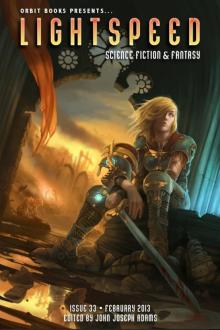 Lightspeed Issue 33
Lightspeed Issue 33 Sea of Silver Light o-4
Sea of Silver Light o-4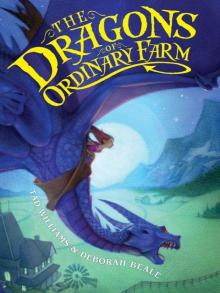 The Dragons of Ordinary Farm of-1
The Dragons of Ordinary Farm of-1 Shadowplay s-2
Shadowplay s-2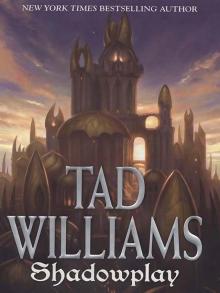 (Shadowmarch #2) Shadowplay
(Shadowmarch #2) Shadowplay